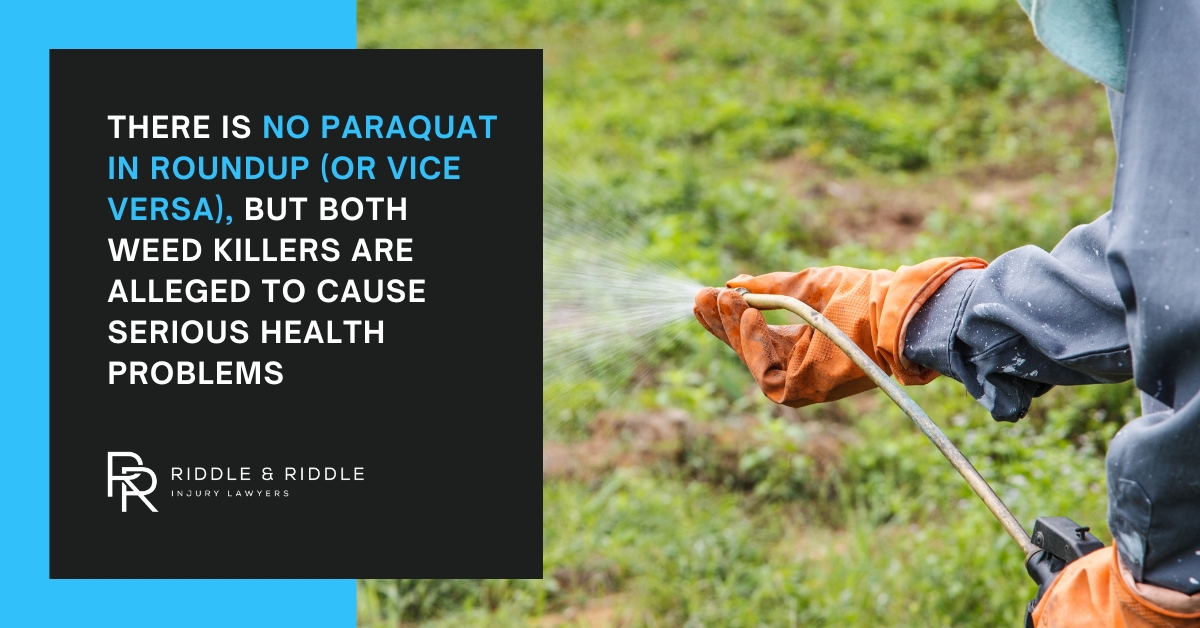Riddle & Riddle Injury Lawyers | August 12, 2021 | Product Liability

Roundup weed killer does not contain paraquat (and paraquat does not contain Roundup), but both herbicides are similar in their popularity among agricultural operations and their potential health risks. While glyphosate, the active ingredient in Roundup, is alleged to cause cancer, including non-Hodgkins lymphoma and chronic lymphocytic leukemia (CLL), paraquat is alleged to cause Parkinson’s disease.
To be clear, both Roundup and Paraquat are potentially dangerous herbicides that may pose serious health risks to those exposed.
Lawsuits Against Paraquat and Roundup Manufacturers
Recently, manufacturers of both paraquat-containing herbicides and Roundup have faced thousands of lawsuits alleging that they continued to market product with known health risks, and failed to warn consumers. Syngenta and Chevron, major manufacturers of paraquat, and Bayer, the manufacturer of Roundup, all deny any negligence or wrongdoing.
IMPORTANT: If you’ve been diagnosed with non-Hodgkins lymphoma or chronic lymphocytic leukemia (CLL) after exposure to Roundup, or you’ve been diagnosed with Parkinson’s disease after exposure to paraquat, you may be eligible for a Roundup or Paraquat lawsuit. Call 1-800-525-7111 for a FREE consultation with an experienced product liability attorney.
IMPORTANT UPDATE: Due to recent developments and the unique circumstances surrounding these lawsuits, Riddle & Riddle is no longer accepting new Roundup cases. We continue to work on securing compensation for our existing clients and are confident that justice will be served. Please stay tuned to our website for any further updates and thank you for considering Riddle & Riddle for your legal needs.
Is Paraquat Still Allowed in the United States?
Despite serious allegations of health risks potentially associated with paraquat, use of the popular herbicide is still allowed in the United States. Paraquat is classified as a “Registered Use” product by the Environmental Protection Agency (EPA), and those applying paraquat for agricultural purposes are required to be trained and licensed.
However, many national and international scientific organizations maintain that paraquat causes serious health problems (including, potentially, Parkinson’s disease), and the herbicide is banned in more than 30 countries.
Scientific and advocacy organizations that have warned against the potential health risks of Paraquat include:
- The Environmental Protection Agency (EPA)
- The World Health Organization (WHO)
- The Centers for Disease Control & Prevention (CDC)
- The American Parkinson’s Disease Association
With scientific evidence and lawsuits against Paraquat piling up, it may be a matter of time before a stricter ban on paraquat-containing herbicides is strongly considered in the United States.
Despite the backlash, Paraquat use has actually increased in the United States in recent years, in part due to warnings associated with Roundup.
Is Roundup Still Allowed in the United States?
Roundup is also still allowed in the United States, despite the serious allegations that glyphosate can cause cancer, including non-Hodgkins lymphoma and CLL.
Roundup is one of the most commonly used herbicides in the United States and is known to be extremely effective. However, in recent years, agricultural operations have increasingly turned to Paraquat and other alternative weed killers due to the health concerns and legal action surrounding Roundup. In 2023, Bayer will stop selling Roundup for residential use in part due to the ongoing litigation.
Like Paraquat, many scientific organizations around the world maintain that glyphosate in Roundup poses potentially serious health risks. Glyphosate is also banned in several countries, but not the US.
Similarities Between Paraquat and Roundup
To be clear, there is no paraquat in Roundup, and no Roundup (glyphosate) in paraquat, but both herbicides share similarities:
- Both Paraquat and Roundup (glyphosate) are enormously powerful and effective herbicides (weed killers).
- Both Paraquat and Roundup are widely used in the United States.
- Both Paraquat and Roundup are believed to cause serious health problems (Parkinson’s disease may be caused by paraquat; and non-Hodgkins lymphoma and chronic lymphocytic leukemia may be caused by Roundup)
- Both Paraquat and Roundup are enormously controversial.
- Both Paraquat and Roundup are subjects of thousands of lawsuits alleging that manufacturers marketed products with design defects and failed to warn consumers of known health risks.
Do You Have a Paraquat Cancer Claim?

If you believe that exposure to either Paraquat or Roundup has caused a serious health problem such as Parkinson’s disease (potentially due to Paraquat), or non-Hodgkins lymphoma or chronic lymphocytic leukemia (CLL) (either potentially due to glyphosate in Roundup), you may be eligible for compensation.
For a FREE consultation with an experienced product liability lawyer handling paraquat and Roundup claims, please call 1-800-525-7111 or complete the fast and easy form below.
There are no upfront costs, and you won’t pay any attorney fees unless we win your case, and you receive compensation.
Please call 1-800-525-7111 and let’s discuss your claim.
Since 1985, Riddle & Riddle’s attorneys have recovered hundreds of millions of dollars for victims of negligence, and we’d love to help you if we can (see disclaimer below).
“I would recommend them to anyone. They fought hard for me.”
–Christine W., Riddle & Riddle client
Justice Counts.
IMPORTANT UPDATE: Due to recent developments and the unique circumstances surrounding these lawsuits, Riddle & Riddle is no longer accepting new Roundup cases. We continue to work on securing compensation for our existing clients and are confident that justice will be served. Please stay tuned to our website for any further updates and thank you for considering Riddle & Riddle for your legal needs.
Contact a Personal Injury Lawyer from Riddle & Riddle Injury Lawyers for Help Today
For more information, please contact Riddle & Riddle Injury Lawyers to schedule a free consultation with a personal injury lawyer in North Carolina today. We have twelve convenient locations in North Carolina, including Greenville, Raleigh, Goldsboro, Jacksonville, Kinston, Charlotte, Greensboro, Durham, Fayetteville, Wilmington, Winston-Salem & Garner.
Riddle & Riddle Injury Lawyers – Raleigh Office
4600 Marriott Dr STE 500, Raleigh, NC 27612
(919) 876-3020
Riddle & Riddle Injury Lawyers – Charlotte Office
1914 J N Pease Pl Suite 142, Charlotte, NC 28262
(704) 486-5824
Riddle & Riddle Injury Lawyers – Durham Office
100 E Parrish St STE 200, Durham, NC 27701
(919) 728-1770
Riddle & Riddle Injury Lawyers – Garner Office
500 Benson Rd Suite 111, Garner, NC 27529
(800) 525-7111
Riddle & Riddle Injury Lawyers – Greensboro Office
7B Corporate Center Ct Suite 15, Greensboro, NC 27408
(336) 516-9066
Riddle & Riddle Injury Lawyers – Greenville Office
300 E Arlington Blvd Suite 2A #110, Greenville, NC 27858
(252) 397-8620
Riddle & Riddle Injury Lawyers – Goldsboro Office
601 N Spence Ave, Goldsboro, NC 27534
(919) 778-9700
Riddle & Riddle Injury Lawyers – Jacksonville Office
3391 Henderson Dr, Jacksonville, NC 28546
(910) 455-5599
Riddle & Riddle Injury Lawyers – Kinston Office
807 N Queen St, Kinston, NC 28501
(252) 397-8624
Riddle & Riddle Injury Lawyers – Fayetteville Office
2517 Raeford Rd, Fayetteville, NC 28305
(910) 387-9186
Riddle & Riddle Injury Lawyers – Wilmington Office
1608 Queen St Suite 12, Wilmington, NC 28401
(910) 889-4064
Riddle & Riddle Injury Lawyers – Winston-Salem Office
102 W 3rd St, Ste 1007, Winston-Salem, NC
